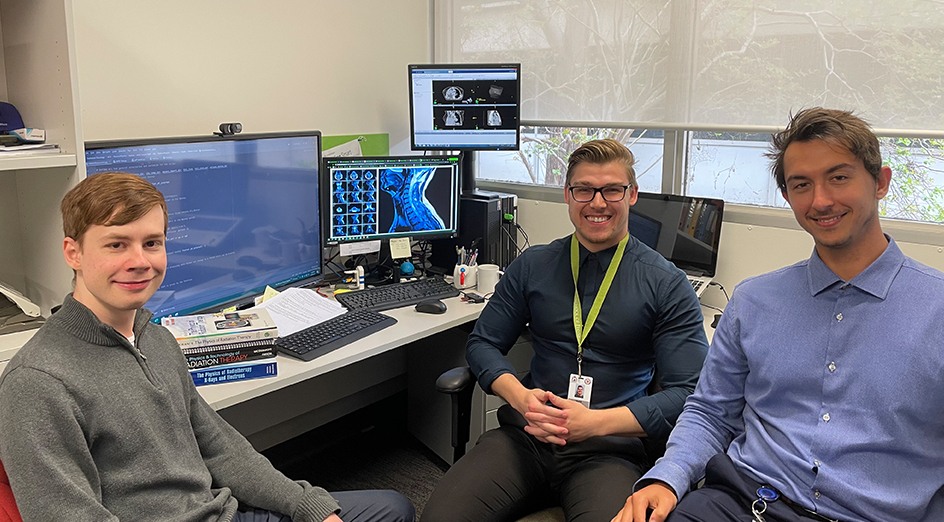A predictive model that improves end of life prognosis for patients in their final stage of life has taken out a state-wide competition aimed at finding innovative solutions to real world healthcare changes.
The 2021 WA Health Hackathon brought together a diverse group of data professionals, digital specialists and students from around the state to tackle 18 unique clinical challenges provided by WA hospitals and health care service providers.
Sixty-one participants in 16 teams were given just one week to come up with digitally-driven solutions to their tasks, which were pitched to a judging panel and scored against a range of criteria.
Representing the UWA Medical Physics group, PhD students Brani Rusanov, Jake Kendrick and Nathaniel Barry formed the SCGH (Sir Charles Gairdner Hospital) Machine Learning Group and were assigned the ‘End of Life Prognosis’ dataset.
Medical Physics program coordinator at UWA’s Department of Physics, Dr Pejman Rowshan Farzad, said the students built a machine learning model capable of accurately predicting whether or not a patient should be recommended for palliative care, based on 18 highly curated features.
“This is important for hospitals and care facilities because it ensures patients are able to receive well-coordinated and high-quality palliative care in the last six to 12 months of life,” Dr Rowshan Farzad said.
“The winning model utilised the fast and accurate Gradient Boosting algorithm, which relies on the intuition that the best possible next model, when combined with previous models, minimises the overall prediction error.”
As their prize, the team received $20,000 in Amazon Web Services credits and one-on-one discussion sessions with artificial intelligence industry leaders. Dr Rowshan Farzad said the students planned to work with stakeholders to expand the solution for commercialisation and clinical use.
 Image: The winning UWA students Nathaniel Barry, Jake Kendrick and Brani Rusanov.
Image: The winning UWA students Nathaniel Barry, Jake Kendrick and Brani Rusanov.
Student Jake Kendrick said for he and his fellow winners pitting themselves against a time clock and a complicated data challenge was a chance to test skills built up over a number of years.
“We’re all in the medical physics course at UWA and good friends so working together came naturally and although it was a huge task to get done in a week, we were very happy to get it over the line and excited now to think we might be able to further improve the model and possibly get it to market,” Jake said.
“A big thank you to Dr Derek Eng, head of palliative care at Royal Perth Hospital and Eva Jones, a resident medical officer at RPH, for allowing us to explore this challenge.”
The Hackathon was held by the WA Data Science Innovation Hub in collaboration with Amazon Web Services, The Kids Research Institute Australia, MTPConnect WA Data Life Sciences Innovation Hub and the UWA Data Science Club.
Director of the WA Data Science Innovation Hub (WADSIH) Alex Jenkins said it was impressive to see that a number of the teams were continuing to work with their challenge providers to refine their solutions and prepare them for real-world usage.
“We’re particularly grateful to all of the hospitals and health care organisations who arranged difficult real world problems and fantastic datasets,” Mr Jenkins said.
“To me this is a great example of what WADSIH is all about – exposing talented young students and professionals to real world data science problems and creating innovative solutions. Such a fantastic mix of skillsets and experiences were brought to the table.”
